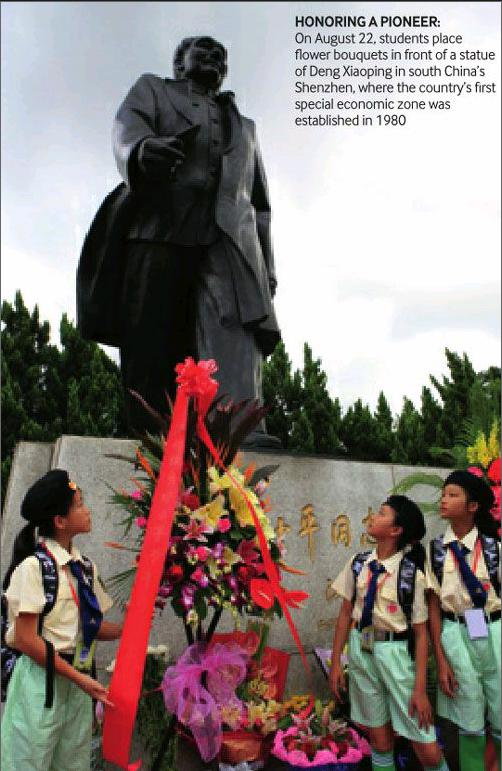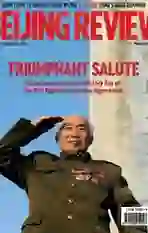Deng Xiaoping: Economist,Diplomat,Reformer
2014-09-23ByKerryBrown
By+Kerry+Brown

Deng Xiaopings role as the father of reform in modern China is historically secure. In his vast biography of the Chinese leader published in 2011, American academic Ezra Vogel set out with meticulous detail the steps by which Deng reached his conclusion that profound reform was utterly necessary for China to fulfill its aspiration to become a strong, rich country.
In the depths of the “cultural revolution”(1966-76), during which Deng had been sent to the countryside to work at a factory, the former high-ranking official who had been so close to then Premier Zhou Enlai (1898-1976) had the opportunity to see firsthand the tough conditions in the rural areas at that time.
It was at this moment, around 1973, that Deng had a great revelation. Socialism in China had to deliver better living standards to people. Practice had to become the criterion for truth, not rigid adherence to ideology. Four years later, Deng, now back in the political center of Beijing, was able to sit at the center of a new post-Mao leadership. At the age of 74, he could do something remarkable at a time in life when most others were deep in retirement.
All-round reforms
The Third Plenary Session of the 11th Central Committee of the Communist Party of China(CPC), held in Beijing in December 1978, is now accepted as the moment when China reset its major strategic direction and embraced a series of groundbreaking reforms which formed the basis of the countrys prosperity and global importance today. At the time, however, commentary in the West was low-key. Many did not expect change in China, and were surprised when, in 1979, the first joint venture law allowing foreign companies to establish themselves was passed. The establishment of special economic zones beginning in 1980 was also a quiet move that made an increasingly massive impact. One could argue that in many ways that the whole of China is now a special economic zone. But under Deng, these first steps were made in only four places, and were then progressively spread out to others.
President Xi Jinping, in his words on the 110th anniversary of Dengs birth, acknowledged on August 20 that Deng was, most importantly, a great Chinese patriot. He was a believer in the importance and status of China as a unified nation, and while it is not often spoken about, most of the policies and strategies Deng supported had this aim in mind. A veteran of Chinas War of Resistance Against Japanese Aggression, and of the struggle for the CPC to come to power before 1949, Deng was one of the first generation of Chinese leaders of the Party, and remained a member for over seven decades. Having seen China made weak and vulnerable, under attack from outside forces, and victimized and exploited, he maintained a profound belief that only a China made wealthy and strong could avoid this calamity ever happening again.endprint
Vogel writes in his biography that Deng knew China lacked technology, intellectual property, an educated political class and the institutions to fulfill its mission and that the most effective way to achieve this, of course, was to open up to the outside world. There were many in the leadership of the 1970s China who opposed this, and felt that China should continue to find its own path without opening up to the outside world—a world which had often been the source of so many of the countrys problems. Deng had the confidence to know that with the right strategy, China would be able to embrace the ideas and approaches of other countries as long as it remained committed to a vision of its core values and ambitions.
Deng and his colleagues had the right intuition in the late 1970s. The philosophy of governance they set in place then—focusing on the economy as the most critical area of improvement, and setting in place policies that opened up some areas while maintaining control over others—has had immense success. From 1978 through 2012, China has enjoyed an annual growth rate of almost 10 percent. Per-capita GDP rose from $300 in 1978 to around$7,000 in 2013.
China has risen to become the worlds second largest economy, largest exporter, second largest importer, and largest holder of foreign reserves by building on the reform template put in place by Deng. Deng is the father of an urbanizing, modernizing, global China. His name will be associated with this achievement, which has been described by some as one of the most important human successes of the last century. His strategy lifted as many as 300 million out of poverty, and created the levels of prosperity across China that we see now.
While Dengs role as economist is widely appreciated, there is little doubt that his achievements in this area would not have been effective if he had not secured diplomatic stability. The reform process was dependent on harmonious relations with neighboring countries, and with major partners like the United States and Europe. Dengs own visit to the United States, after full diplomatic recognition was extended in 1979, was a groundbreaking diplomatic mission. He also visited Japan and encouraged other colleagues to look in detail at the industrial and technological models being used in countries as far away as the UK, Australia, New Zealand, and Canada. This reset Chinas global role, making it less and less isolated and more influential in global affairs.endprint
Deng was able to provide the framework to manage Hong Kongs return to China. This will no doubt be regarded as his main achievement in this realm. But creating an ethos within China where positive relations with the rest of the world were the norm, rather than the exception, and where a genteel, peaceful international atmosphere was regarded as integral to Chinas aspiration to grow and prosper, was an integral part of the context that made domestic economic reforms possible.
A dynamic process
The attitude toward reform and the placing of it at the heart of government policy remain immensely important in China 17 years after his death. During his celebrated southern tour in 1992, Deng stated the choice starkly: reform or perdition. At times in which Chinas commitment to reform has been questioned or under attack, Dengs influence has been a great asset. This remains the case for the current leadership.
But reform is a dynamic process, and no one, least of all Deng, would have believed that there was an easy end point to it. In that sense, he set a very flexible framework, one within which future leaders could have quite wide discretion. The challenges that China faces today are very different from those of 1978. Then, the key mission was building prosperity through modernization and industrialization. Unleashing productivity in the economy by reforms in the agricultural sector and a commitment to the “four modernizations”—the reshaping of agriculture, industry, national defense and science and technology—were key.
In 2014, these core areas are different. Building an economy where there is a domestic finance sector, a higher services proportion as part of GDP and more consumption, and accelerating urbanization are now vital, with the enormous challenge of sustainability looming over this.
Premier Li Keqiang has talked of the core mission being to deliver “fast, sustainable growth.” The focus of reform in China since the Third Plenary Session of the 18th CPC Central Committee in late 2013 has been to set out the right reformist framework in which this can occur. Some measures involve social changes like delivering a higher level of welfare and equality and increasing efficiency in the realms of governance and the economy. Others involve creating a more innovative, higher valueadded industrial and entrepreneurial model. The efficient use of capital and the construction of a better tax base are two of the many key elements of this new era of reforms.
While very different from the issues of China over three decades ago, these current challenges are part of the same spectrum of change and development launched in 1978. In that sense, Dengs influence remains strong, despite the transition that China is making toward a new phase of its growth and development. The vehicle is very different these days, but it runs on the same broad tracks that Deng set for it.endprint
